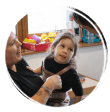
Lorraine has been a Paediatric Nurse at Little Bridge House for 17 years.
Unlike some jobs, you cannot plan or assume the kind of shift you might have ahead; you could be taking a child out for a lovely sensory trip in the sunshine, giving parents a well-deserved rest.
We may be involved with the symptom control of a child, who might have come in as an emergency visit to manage their pain, seizures or feeding issues. Or we may accompany teenagers on their much looked-forward to shopping trip.
People often say ‘I don’t know how you do your job’, as a nurse, it is an absolute privilege to care for these children and families.

But it does not end there; after losing a child, we can spend the following days helping to make funeral arrangements, taking any additional and unnecessary stresses away.
Our bereavement support is on-going and is available for as long as the family need it. With your support, I can continue to make a difference to each one of them.
As you can imagine it’s been extremely different working in care throughout the pandemic.
Not only have we had to adjust to new ways of working within the hospice following Department of Health guidelines, get used to wearing appropriate PPE for the children we’re looking after and particular nursing tasks we’re carrying out, we have also had to fulfil the role of supporting our families through this extremely scary time while many of them have been shielding to ensure their sick child is kept safe.
Throughout this time, it has been a slow process and remains far from normal, but it feels satisfying to know that we have been able to support some of our families in the community who have struggled with their care packages as a result of the pandemic.
We have been able to offer short care shifts at home for the parents to have a brief but much earned break, numerous supportive phone calls to our families, and liaise with community teams for further support where needed.
Our new ways of working have supported us in being able to welcome families to the hospice for resilience, symptom management and end of life stays, while providing a safe environment and caring for them in allocated ‘zones’ of the house.









